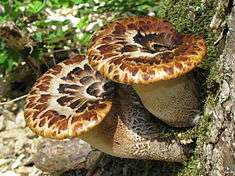Polyporaceae
| Polyporaceae | |
|---|---|
 | |
| Dryad's saddle (Polyporus squamosus) | |
| Scientific classification | |
| Kingdom: | Fungi |
| Division: | Basidiomycota |
| Class: | Agaricomycetes |
| Order: | Polyporales |
| Family: | Polyporaceae Fr. ex Corda (1839)[1] |
| Type genus | |
| Polyporus P.Micheli ex Adans. (1763) | |
The Polyporaceae are a family of poroid fungi belonging to the Basidiomycota. The flesh of their fruit bodies varies from soft (as in the case of the dryad's saddle illustrated) to very tough. Most members of this family have their hymenium (fertile layer) in vertical pores on the underside of the caps, but some of them have gills (e.g. Panus) or gill-like structures (such as Daedaleopsis, whose elongated pores form a corky labyrinth). Many species are brackets, but others have a definite stipe – for example, Polyporus badius.
Most of these fungi have white spore powder but members of the genus Abundisporus have colored spores and produce yellowish spore print]s. Cystidia are absent.
Genera

Fruit bodies of Cerrena unicolor covered with algae
Genera include:
- Abundisporus
- Amyloporiella
- Aurantiporus
- Australoporus
- Austrolentinus
- Bridgeoporus
- Cerrena
- Cinereomyces
- Coriolopsis
- Cryptomphalina
- Cryptoporus
- Cystidiophorus
- Daedaleopsis
- Datronia
- Dentocorticium
- Dichomitus
- Diplomitoporus
- Earliella
- Echinochaete
- Epithele
- Epithelopsis
- Erastia
- Faerberia
- Favolus
- Flabellophora
- Fuscocerrena
- Fomes
- Globifomes
- Grammothele
- Grammothelopsis
- Hapalopilus
- Haploporus
- Hexagonia
- Hymenogramme
- Laccocephalum
- Laetifomes
- Lentinus
- Lenzites
- Leptoporus
- Lignosus
- Lithopolyporales
- Lopharia
- Loweporus
- Macrohyporia
- Megasporoporia
- Microporellus
- Microporus
- Mollicarpus
- Mycobonia
- Myriothele[2]
- Navisporus
- Neofavolus
- Neolentinus
- Nigrofomes
- Oligoporus
- Pachykytospora
- Panus
- Perenniporia
- Phaeotrametes
- Piloporia
- Podofomes
- Polyporus
- Poria
- Porogramme
- Poronidulus
- Pseudofavolus
- Pseudopiptoporus
- Pycnoporus
- Pyrofomes
- Royoporus
- Rubroporus
- Ryvardenia
- Skeletocutis
- Sparsitubus
- Spongipellis
- Stiptophyllum
- Thermophymatospora
- Tinctoporellus
- Trametes
- Trametopsis
- Trichaptum
- Tyromyces
- Vanderbylia
- Wolfiporia
- Xerotus
References
This article is issued from Wikipedia - version of the 11/20/2016. The text is available under the Creative Commons Attribution/Share Alike but additional terms may apply for the media files.